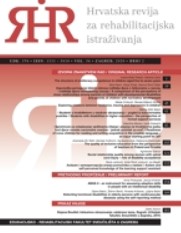EXPLORING RELATIONS BETWEEN RESILIENCE, TRAUMA AND DEPRESSION IN CHILDREN
EXPLORING RELATIONS BETWEEN RESILIENCE, TRAUMA AND DEPRESSION IN CHILDREN
Author(s): Marija Crnković, Renata Miljević-RiđičkiSubject(s): Clinical psychology, Behaviorism, Studies in violence and power, Health and medicine and law
Published by: Sveučilište u Zagrebu, Edukacijsko-rehabilitacijski fakultet
Keywords: depression; resilience; psychological trauma; abuse;
Summary/Abstract: Defining psychological resilience is a challenge for researchers and mental health professionals. More recent understandings of resilience define it as the capacity of a dynamic system to successfully adapt to disruptive factors that threaten the sustainability or development of that system. The present study aimed to examine the relationships between psychological trauma, depression and certain factors of resilience in a clinical sample of children (N = 103). To test the hypotheses, the following measuring instruments were used: the Trauma Symptom Checklist (TSCC), Beck Youth Inventories - Second Edition, Child and Youth Resilience Measure (CYRM-28), as well as assessment of psycho-traumatization. The results were not quite consistent with previous studies of resilience, so that the hypothesis that abused, non-traumatised children would have significantly higher scores on the resilience measure than abused children was not confirmed. The results do suggest that abuse is more likely to occur among children whose caregivers do not provide care for their physical and psychological needs. It has also been confirmed that caregivers’ neglect of psychological needs is related to more significant negative psychological outcomes than caregivers’ neglect of physical needs. Additionally, the study found a greater negative correlation between resilience and depression in traumatised children than in non-traumatised children.
Journal: Hrvatska revija za rehabilitacijska istrazivanja
- Issue Year: 56/2020
- Issue No: 2
- Page Range: 45-60
- Page Count: 16
- Language: English

